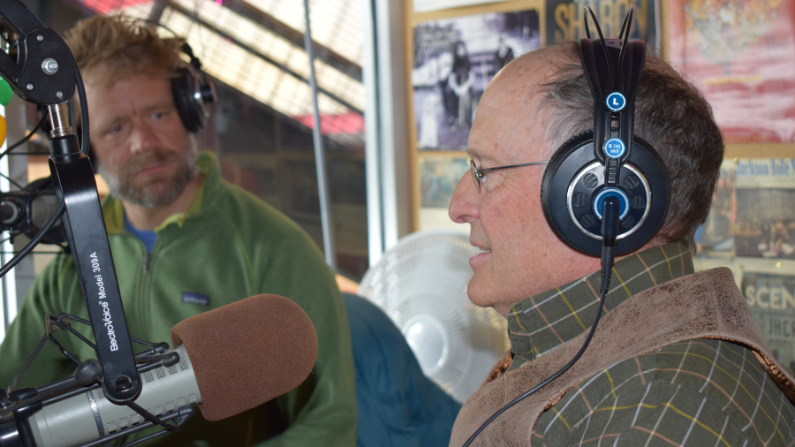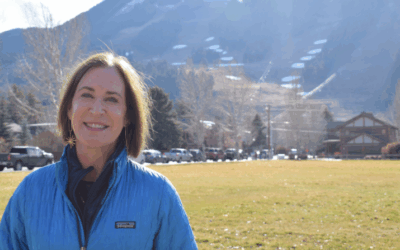Slow Food in the Tetons is a non-profit organization in Jackson that hosts the People’s Market, a year-round farmers market that serves as a gathering space for the community to celebrate local, regional, clean and fair food.
Haderlie Farms in Thayne, Wyoming, has been involved with the Slow Food family for many years and is a diverse family farm that focuses on soil restoration to produce nutrient-dense foods. It also stresses the importance of building a better food system.
In advance of the Feb. 2022 edition of the People’s Market at The Center for the Arts, Slow Food in the Tetons executive director Scott Steen, and owner/operator of Haderlie Farms Curtis Haderlie, joined us in the KHOL studios.
The following interview transcript has been edited for clarity and brevity. You can hear the full conversation, which was recorded on Thursday, Feb. 10, at the link above.
KHOL: So besides the obvious difficulties of the short growing season in Wyoming, what are some other barriers to farmers or individuals trying to start a food-based business here in Wyoming?
CURTIS HADERLIE: Yeah, there are definite challenges as probably everyone listening has heard. Teton County has blown off the charts as far as personal income. We’re the highest in the nation. And as far as the county, Teton County is higher than any other county in the nation. And with that, land prices follow right along with that. So if you are an aspiring farmer, to farm, you need land, right? And unless you have a very big checkbook, that’s a very significant barrier to getting involved in farming is the price of land. If you’re going to be a farmer, it’s nice to own your ground so that the blood, sweat and tears you put into it over the years, you know it’s not going to be taken away from you or sold or something like that. So renting farm ground is a risky proposition that way.
Other than the price of land, labor is a huge issue. I always say, if you want to work very hard for very little money, come apply. So, farming is not an extremely lucrative business, so it has to be something that’s inside of you. Something that’s coming from the heart. You have to really want to do it. I call it passion. You have to have a real desire to be connected to the land and the soil and animals and the plants, whatever you’re involved with. I’m fortunate right now to have a good group of people that have that passion that are willing to get up in the morning and milk a cow when it’s 10 below or 20 below at five o’clock in the morning in the dark. I mean, (there are) not a lot of applicants for that type of job. And then in the summertime, when we’re doing everything simultaneously, the hours are long. And even though we’re in a cold climate, it gets hot here in the summertime when you’re working out in the hot fields, either hauling hay or changing sprinklers or harvesting vegetables, whatever it may be. So it’s demanding. So it takes a special person with that inner drive and the understanding that the rewards aren’t necessarily financial, and especially you have children, which we do. We have a family living on the farm and working now, and it gives me a lot of satisfaction in watching that family work together. Watching those kids be being raised on a farm.
And then finally, I’ll just mention that regulation is an issue. As farmers, I feel that we are self-regulating. I cannot afford to create an inferior product or a product that would ever hurt or harm someone. And so I don’t need oversight saying, ‘OK, you need to do something different to produce a better product,’ because again, if I was to produce an inferior or an unsafe product, I would be out of business very, very quickly because I’m small and word would travel very quickly. So regulation takes a lot of time and sometimes money. So I’m an advocate for less regulation and less oversight and letting the consumers vote with their dollars if I’m doing a good job or not.
KHOL: So Curtis, you spoke about passion. I know you have passion in areas [other] than farming. You also run your own online market platform, Wind River Herbs, and operate WyoFarm Composting. For those that may be new to the idea, can you explain the benefits of composting, soil restoration and how important it is to divert food waste from entering the landfill to become compost instead?
HADERLIE: Yeah, now you truly are getting to my passion, because being a farmer and a composter is like you’re hitting the sweet spot. You’re able to grow nutrient-dense food. But to do that, you are employing the use of biology in the form of on-farm-produced compost, which just creates a magical situation. So what we do is we have a service where we collect food scraps from individuals and businesses in Teton and Lincoln counties and we take them to the farm. We mix them with woodchips and then we compost them. I have a little business card that says ‘Curtis Haderlie, compost facilitator.’
At that point, I’m not doing much other than turning the piles because nature’s doing all the work. At that point, the bacteria and fungi and little critters are doing all of the work. Breaking all of that down. And it’s, you know, picking up food scraps. People walk by my trailer when I’m dumping that stuff in there and they’ll hold their nose or make a funny face. But to me, those are nutrients. And to take that to the farm, put it in a pile, and within a few months, you’ve got this black crumbly stuff that doesn’t smell at all. And you put that on the soil. And after having done this for several years, the soil is completely different.
My native soil on my farm is quite rocky and kind of hard to work, especially by hand. But you add that compost to that soil and it just turns into a totally different situation. It’s just really nice to work [with[. You can put your hands or your digging tools in there, and it’s just loose and easy to work with. And the products that are coming out of there are better than they were ten years ago. They are. We have less disease or insect pressure. It takes less water and the nutrient quality of the products that we produce is higher.
We do Brix testing, which is basically just how much sugar is in the plant, which is an indication of how much nutrition is in the plant or in the end product. And it’s just rewarding to, I guess, participate in nature in a natural process because, if you just throw a banana peel out by the side of the road, it’s going to break down. And that’s nature. So in composting, we just try to facilitate that process and it really is a win-win.
So instead of putting your banana peels in the trash, which then go to the transfer station here in Teton County, which then gets put on a truck and hauled to Bonneville County, Idaho, in a landfill that is not doing anyone any good except spending a lot of money and consuming a lot of diesel to move all that stuff around. Why not give it to a local farmer that can take it to his farm? Put it in a compost pile? Turn that into a stable product that then goes back on the soil for myself or someone else that buys the compost and benefits everyone involved. It’s a win-win, and once you start composting, believe me, you become kind of a fanatic about it.
And I hear this comment frequently of people that have moved from other places to Jackson. They’re like frantically looking for the place to compost because it’s painful for them to put their orange peels in the trash. Because they’re used to having an option for composting. So even though we’ve only been doing this like three years, we have collected a lot of food scraps to the tune of like 400 tons a year. We’re proud of that and we’re looking forward to that continuing to grow as we get the word out about the benefits of composting food scraps and how that benefits farmers in general.
This coverage is funded in part with an Arts For All grant provided by the Town of Jackson and Teton County.






